Konrad Adenauer: Post-War Chancellor of Germany

Adenauer was Germany’s first chancellor after the second world war who was in office from 1949 to 1963. Although he was the oldest statesman elected into office, his zeal for his duty in office led him to establish Germany as a democracy and one of the world’s economic giants. His popularity among Germans saw him re-elected three times, resigning later following the Spiegel Scandal.
5. Early Life
Konrad Adenauer was born on January 5, 1876, in Cologne, Germany to Johann and Helene Konrad as the third of five children - August, Johannes, Lilli, and Elisabeth. Adenauer was a devout Roman Catholic since childhood. Konrad studied law and politics at the universities of Freiburg, Munich, and Bonn. Respiratory problems disqualified him from joining the German army in 1896. After his graduation in 1920, he worked at the court in Cologne as a lawyer. Adenauer was a naturalist who supported growing plants without adding chemicals. He had extensive knowledge of medicinal plants which he attributed his good health.
4. Contributions
Konrad was elected as the first chancellor of the Federal Republic of Germany after his release from a concentration camp. In his 14 years of leadership, he worked towards re-establishing the dignity of Germany as an economically prosperous and politically stable country after years of ruin during the Nazi regime and the WWII. His focus on foreign policy managed to forge close relationships with countries like the UK, US, and France and contributed to the productivity and prosperity of post-world war Germany into a democratic nation. Germany rose to become the third largest economy in the world in his leadership.
3. Rise to Power
Adenauer joined the Centre Party in 1906 and became a member of the Cologne city council. He was elected as the vice-mayor for Cologne in 1909 and later served as mayor from 1917-1933. Throughout his political career, Principles of Christian morals, decency, diligence and order were the guiding light for Konrad. During WWI, he worked with the Army providing them with supplies and transportation for the western front. That way, the residents of Cologne escaped the severe food shortages affecting the cities of Germany towards the end of WWI. His good working relationships with the Social Democrats were instrumental in maintaining control and relative stability in Cologne amidst threats of a revolution. He was elected to office in 1949 and later re-elected three times. He retired in 1963.
2. Challenges
During his career, Konrad faced some difficulties including dismissal from office during the Nazi era after the dissolution of his city council and the Prussia parliament. His bank accounts were also frozen. Bankrupt and jobless, Konrad ensured the safety of his family and lived with several of his friends, changing residences every so often to escape arrest. The Nazi regime presented a difficult time for him as his political views got him arrested several times.
1. Death and Legacy
Konrad is remembered as a shrewd and visionary leader dedicated to public service and development. His leadership in the Christian Democratic Union is widely recognized as he drove the party towards national influence and recognition. After his death in 1967 at 91 years, Germans acknowledged him for returning the last prisoners of war from the USSR and accorded him a state burial. In 2003, he was named the greatest German man of all time. Several establishments have been founded in his respect such as The Konrad-Adenauer-Stiftung scholarship program, the Konrad Adenauer Foundation, and European unification commemorative coin.







